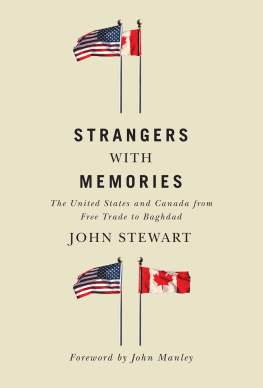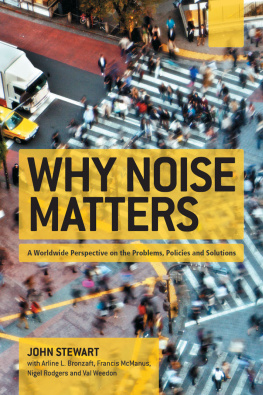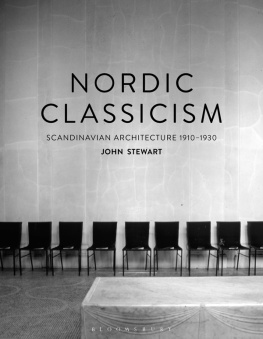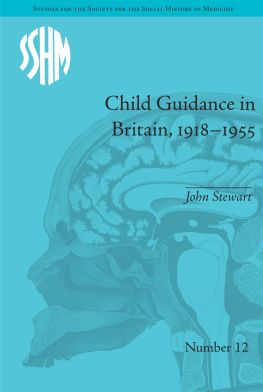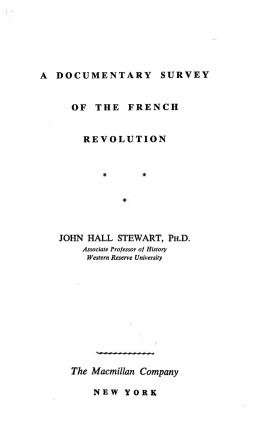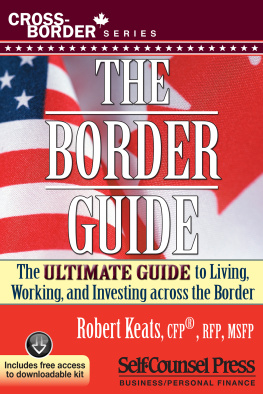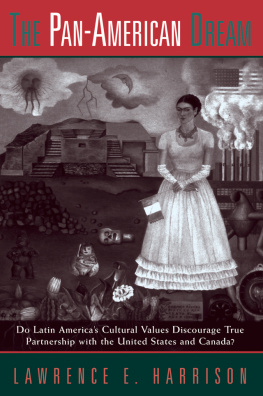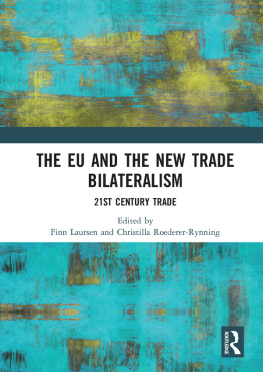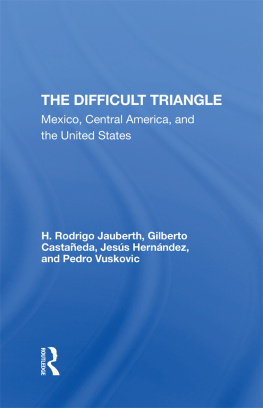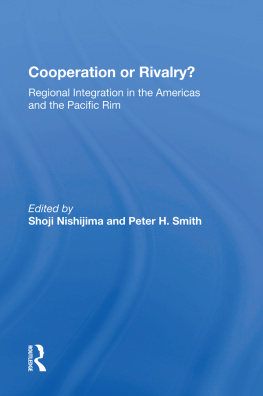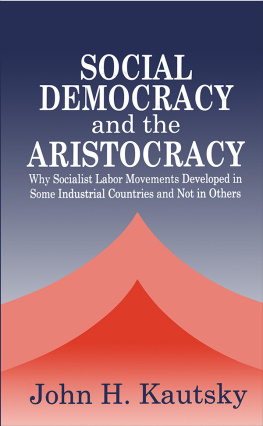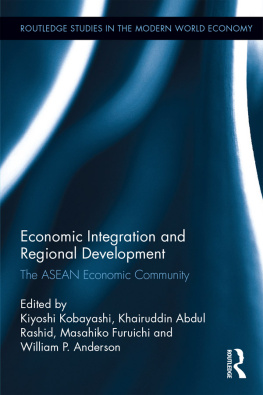
STRANGERS WITH MEMORIES
STRANGERS
WITH
MEMORIES
The United States and Canada from Free Trade to Baghdad
JOHN STEWART
McGill-Queens University Press
Montreal & Kingston London Chicago
McGill-Queens University Press 2017
ISBN 978-0-7735-5140-4 (cloth)
ISBN 978-0-7735-5199-2 (ePDF)
ISBN 978-0-7735-5200-5 (ePUB)
Legal deposit third quarter 2017
Bibliothque nationale du Qubec
Printed in Canada on acid-free paper that is 100% ancient forest free (100% post-consumer recycled), processed chlorine free.
McGill-Queens University Press acknowledges the support of the Canada Council for the Arts for our publishing program. We also acknowledge the financial support of the Government of Canada through the Canada Book Fund for our publishing activities.
Library and Archives Canada Cataloguing in Publication
Stewart, John, 1960, author
Strangers with memories : the United States and Canada from free trade to Baghdad / John Stewart.
Includes bibliographical references and index.
Issued in print and electronic formats.
ISBN 978-0-7735-5140-4 (cloth). ISBN 978-0-7735-5199-2 (ePDF). ISBN 978-0-7735-5200-5 (ePUB)
1. Canada Relations United States History 21st century. 2. United States Relations Canada History 21st century. I. Title.
FC249.S825 2017 | 327.7107309051 | C2017-903371-9 |
C2017-903372-7 |
This book was typeset by True to Type in 10.5/13 Sabon
To my parents, Russ and Lucy Stewart, who enjoy history
and have lived some of it
Contents
by John Manley
Foreword
JOHN MANLEY
As the sun rose over North America on 11 September 2001, I was aboard an Air Canada 747 en route from Frankfurt to Toronto. I was Canadas minister of foreign affairs, returning home after ten days of meetings with counterparts in London, Paris, Riga, and Berlin. At one point, a flight attendant asked me to go to the flight deck; I assumed it was another friendly captain inviting me to experience flying from the cockpit while he shared his views on what our government should or should not be doing. While I enjoyed these visits when they were offered, I was tired from a long trip and would have been happy to relax with a book or a movie.
Little did I know that I was being invited forward so I could hear BBC Radios live description of events unfolding in New York and Washington on a day that would change history and profoundly affect the United States, Canada, and the world. As my mind struggled to comprehend what had just happened an effort made even more challenging by radio reports of the chaos and calamity on the ground I found myself thinking, This changes everything, and praying, Please, God, whoever is responsible, may there be no connection to Canada!
The terrorist strikes of 9/11 did change everything. Although there was never any evidence of a Canadian connection, the repercussions for Canada-US relations were profound and mostly unfavourable. This was a turning point in a relationship that, since the 1965 Auto Pact, had been characterized by ever-closer economic cooperation and convergence. The border between Canada and the United States never formally closed on or after 9/11, but it might as well have done so. Nobody in an operational role seemed to know what to do. Long lines of trucks and other vehicles formed, and commerce stopped.
I soon found myself in a key role as Canadas counterpart to Governor Tom Ridge, the newly designated White House adviser on homeland security. I was also appointed to chair a new cabinet committee on public security and anti-terrorism, and as such became the governments main spokesperson on matters arising from 9/11. I still refer to this period of my political career as my moment of fame. Time Canada named me its 2001 newsmaker of the year, a dubious distinction given that the previous honoree had been the ill-fated John Roth, the CEO of Nortel Networks during its brief tenure as Canadas most valuable corporation.
Managing border issues with a willing and able partner was one thing, but being the point person in a relationship of vital importance to the national interest before and after the invasion of Iraq in March 2003 was something else entirely. US officials did not hide their disappointment when Prime Minister Jean Chrtien declined to send troops to Iraq, or even to offer words of political support, but this was manageable. President George W. Bush had respect for Chrtien and appreciated the prime ministers direct and honest approach. He once told me, I like your boss! I can work with him. But when a minister, an MP, and even a member of the prime ministers staff make derogatory comments about the president of the United States, some backlash is inevitable.
Fortunately, Tom Ridge and I had built sufficient rapport and mutual trust that we could work through this. It helped that his explicit instructions from President Bush were that security measures at the border should not impede commerce. We signed the Smart Border Declaration on 11 December, exactly three months after 9/11, and met regularly and frequently over the next two years to give the agreement life. I left the government when Paul Martin became prime minister. As John Stewart notes in his account of that period, President Bush was disappointed by Martins equivocation and dithering, but the Smart Border work continued under my successor, Anne McLellan.
It has been said that the prime minister of Canada has two overriding responsibilities: preserving the unity of the country and managing its relationship with our powerful neighbour. Both of these themes emerge with clarity in this book. John gained a unique perspective as a Canadian employed by the US Embassy from pre-NAFTA days, when Brian Mulroney and George H.W. Bush headed their respective governments, through to the years of Stephen Harper and Barack Obama. Strangers with Memories provides a detailed description of the complex relationship between two countries that, for all their similarities, often fail to understand each other.
Special personal relationships between Prime Minister Mulroney and Presidents Ronald Reagan and Bush 41, between Prime Minister Chrtien and President Bill Clinton, and perhaps between Prime Minister Stephen Harper and President Bush 43 all affected the relationship for the better. The tensions between Chrtien and Bush 43 and subsequently Harper and Obama were problematic. So too was Paul Martins willingness to pander to anti-American sentiment during his brief period as prime minister.
During Canadas constitutional troubles in the 1980s and 1990s, the United States skilfully avoided provocation while discreetly supporting the federalist cause. Meanwhile, Canadians confronted deep-seated insecurities during the great free-trade election of 1988. That our citizens have since shown little desire to reopen the debate no doubt reflects the degree to which cross-border supply chains have reshaped and benefited our economy, contrary to the dire predictions of free-trade opponents. (Full disclosure: yours truly ran for the Liberals in that election.)
Canadians bristle at the perceived American ignorance of all things Canadian. Rick Mercers long-running Talking to Americans segments in which he ridiculed unsuspecting targets in random interviews on US streets encapsulated Canadians complex feelings about our neighbour. We care deeply what Americans think about us but cling to a moral superiority that in my view is both undeserved and embarrassing. Our dependence on a big and powerful neighbour has bred a kind of insecurity in Canadians. We need to remember that its not all about us!
Next page
